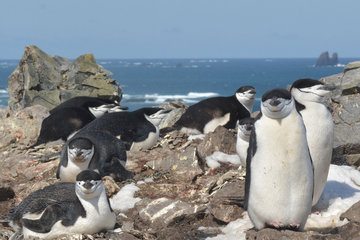Honoring the publications of young scientists
This year's Young Scientist Award goes to Gianina Ungurean and Giacomo Costalunga
The publication of a scientific paper is the result of years of work, a lot of passion and effort. With the Young Scientist Award, we want to honor groundbreaking publications by young scientists at the Institute. This year, the €1000 prize goes to Gianina Ungurean and Giacomo Costalunga. Their respective publications in Nature Communications and Current Biology provide new insights into the sleeping pigeon brain and the singing abilities of nightingales.

Do pigeons dream in their sleep?
For a long time, dreaming seemed to be exclusively reserved for humans. In the award-winning study, Gianina Ungurean from Niels Rattenborg's research group used functional magnetic resonance imaging to investigate the activation patterns in the brain of sleeping pigeons. Together with her colleagues, she found that during REM sleep phases, the brain areas responsible for processing visual stimuli during flight are particularly active – suggesting that pigeons may dream of flying during sleep.
Additionally, the researchers were able to show for the first time that the flow of cerebrospinal fluid is dramatically diminished during this sleep phase. In the less active non-REM sleep, the flow is supposed to help remove waste from the brain. These findings provide new, important insights into the biology of sleep and suggest that the active brain state during REM sleep might come at the cost of reduced brain clearance.
Gianina Ungurean studied Biotechnology in Lyon before conducting her PhD work in the research group “Avian sleep” at the Max Planck Institute for Biological Intelligence. Since 2022, she has been working as a postdoctoral researcher at the Multiscale Bioimaging Cluster of Excellence from the University of Göttingen, and at the Max Planck Institute for Biological Intelligence.
Fascinating singing abilities of nightingales
Nightingales are known for their exceptional singing abilities. During the breeding season, nightingales perform singing duels to attract partners and defend their territory. In the award-winning study, Giacomo Costalunga from Daniela Vallentin`s research group and his colleagues investigated the extent to which nightingales can adapt their songs to match those of their competitors – similar to how we humans adjust the volume or pitch to that of our conversation partners.
The researchers were able to show that the birds exchange whistle songs with their rival neighbors and flexibly adjust the pitch across a broad frequency spectrum. This was observed in the breeding territories in Germany and also in the wintering grounds in Africa, where they usually do not produce sophisticated song. The results indicate the existence of a neuronal circuit that allows nightingales to precisely adjust the pitch of their whistle songs to their opponents in real time.
Giacomo Costalunga obtained his bachelor's degree in biology at the University of Padua in Italy before moving to the University of Trieste for his master's degree. Since 2020, he has been a PhD student in the research group “Neural Circuits for Vocal Communication” at the MPI for Biological Intelligence, studying the complex vocal behavior of nightingales.














